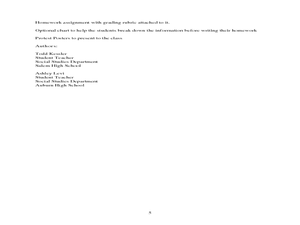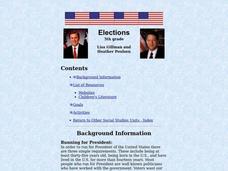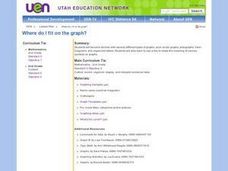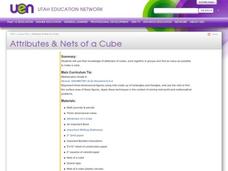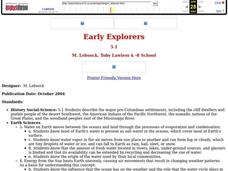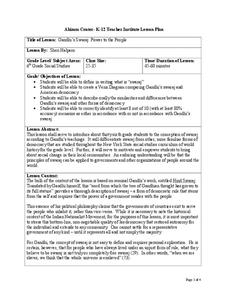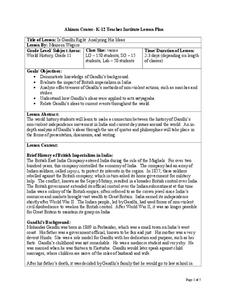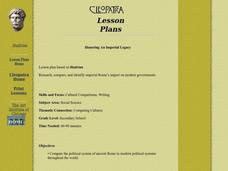Curated OER
My Way or the Highway
Students read "Saudis Uneasily Balance Desires for Change and Stability" from The New York Times and discuss Saudi Arabia as it considers a change from monarchy to democracy. Students work in groups to research and create timelines on...
Curated OER
Fossils Footprints Across Time
Learners examine fossils to understand how they are formed and how they give information about geological history. In this fossil instructional activity, students research and write about fossils and make models of different fossil...
Curated OER
1968 – A Generation in Revolt
Tenth graders compare and contrast the revolts that took place around the world in 1968. In this global studies lesson, 10th graders research the youth revolts that took place in Paris, Prague, and Chicago in 1968 and create posters and...
Curated OER
Respect for Authority
Young scholars examine the country of Mongolia and how it is trying to form a democracy. As a class, they participate in a class meeting about a new class rule and they voice their opinions. They read excerpts of a letter of a Peace...
Curated OER
Elections
Fifth graders examine the voting process, the electoral college and the voting process. They identify qualities important to a president. They fill out ballot sheets and study the registration forms.
Curated OER
Where Do I Fit on the Graph?
Students collect data and create graphs about themselves, their community, and the world around them. They use a variety of methods to organize data, such as stickers, clothespins, name tags, coloring, tally marks, etc.
Curated OER
The Wind & Sun: Powerful Alternatives
Students examine the power that is possible from the sun through an interactive program. They also analyze how energy turns into different forms in different parts of the human body. They finally explore how wind is created and how wind...
Curated OER
Discovering Mexico through Murals
Students describe the Mexican culture and relate it to their own culture. They investigate the Mexican culture through internet research, textbooks, and class discussions. Students create a mural of their school culture. They interview...
Curated OER
Math: Graphs and Their Symbols
Second graders examine different types of graphs and discover the meanings of the symbols used on them. After gathering data about themselves, their communities, and the world, they use that information to create graphs. Among the...
Curated OER
Attributes & Nets of a Cube
Third graders engage in a lesson that focuses on the attributes and forming of a cube. They construct a cube using different combinations while comparing a square with only two-dimensions. Students fold paper while following the...
Curated OER
Slave Auctions in South Carolina
Students examine primary sources in the form of auction records, create frequency charts, graphs and diagrams that they analyze to anwer questions followed by the writing of a paper that demonstrates their comprehension of the lesson.
Curated OER
Early Explorers
Fifth graders study early explorers. In this World history instructional activity, 5th graders draw an outline of a map labeling each part, build geographical features out of dough, and paint each of the land and water features.
Curated OER
Fighting Back
Learners identify different methods of resistance used by Jews during the Holocaust and classify them as either passive or active forms of resistance. They create a role play of a husband and wife on whether they should hide a child of...
Museum of Tolerance
The Role of Citizens in a Participatory Democracy
Groups research participatory democracies and compare the role and rights of citizens in ancient history with those in recent U.S. history. Guided by a series of questions, individuals compose a persuasive essay in which they discuss the...
Museum of Tolerance
Citizenship Then and Now: Comparing Ancient Rome and Contemporary American Society
Class members research citizenship in Ancient Rome and in the United States and use the provided graphic organizers to compare the rights and responsibilities of citizens in these two democracies.
Curated OER
What would you do if faced with this problem?
Students determine how and why an individual from each of four disciplines - Buddhism, Taoism, Confucianism, and Legalism - might respond to the same problem.
Curated OER
Ellis Wilson: An Elementary School Art Lesson
Students study the life of Ellis Wilson. They examine the use of simple shapes when drawing human figures. They examine how to incorporate pattern into a background setting.
Curated OER
Water World Story
Fourth graders write a story about how a drop of water may have traveled to school. They design a presentation on the water cycle.
Curated OER
Gandhi's Swaraj: Power to the People
Sixth graders discover what a swaraj is. In this world history lesson, 6th graders create a Venn Diagram comparing Gandhi's swaraj to American's democracy.
Curated OER
Comparing Sparta and Athens
Students are taught the differences between totalitarianism and democracy. They discuss the historical roots of the democratic tradition. Students are introduced to the term totalitarianism and are told that it is a form of government...
Curated OER
Hammurabi's Code of Laws
Students explore why the need arose for laws to govern society, comparing and contrasting hunter/gatherer societies vs. agrarian societies. They write letters to the editor of the Babylonian Times, discussing their opinion of Hammurabi's...
Curated OER
Is Gandhi Right: Analyzing His Ideas
Students explore the connection between Gandhi and the Independence Movement in India. In this lesson on social change, students examine the ideas of Gandhi to analyze non violent change. Students consider the impact of British...
Curated OER
Marie Antoinette and the French Revolution
Learners examine how the French and American revolutions influenced and emergence of free press in these countries. Students explore the link between government control of the press and the type of government. They compare and contrast...
Curated OER
Honoring An Imperial Legacy
Students research, compare, and identify imperial Rome's impact on modern governments. They compare the political system of ancient Rome to modern political systems throughout the world.




